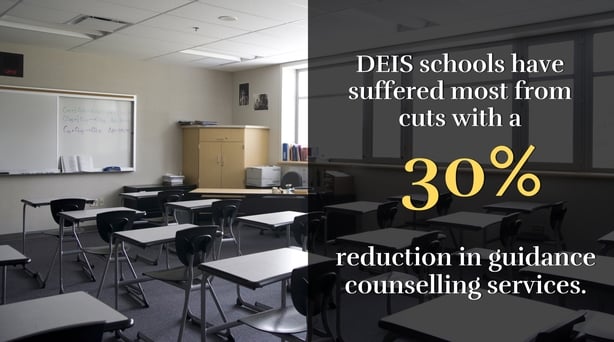A study of guidance counselling provision for second-level students has found more than one in five fee-charging schools are paying privately for guidance counselling services since cutbacks to provision were imposed four years ago.
The survey, by the Institute of Guidance Counsellors, has found that disadvantaged schools have suffered most from the cuts, with a 30% reduction in services to students.
On the other hand, the provision of guidance counselling in fee-charging schools has actually increased by 2% over the same period.
Just over half of the country's second level schools participated in this survey.
The sample is loosely representative of the different types of schools in the sector.
It is the fourth time the IGC has measured the impact of the cuts in this way.
The survey has found a significant imbalance in the impact of the cuts, with disadvantaged or DEIS schools losing out the most, cutting their guidance counselling service to students by 30%.
Non-DEIS schools have cut provision by 27%.
The fact that fee-charging schools appear to have actually increased their provision - by 2% - may be, according to the IGC, a reflection of the fact that guidance counselling services are now being privately purchased by more than 20% of fee-charging schools.

The President of the Institute of Guidance Counsellors said there has been a "devastating loss" of guidance counsellors in schools with 53% of the service cut in all schools in recent years.
Speaking on RTÉ’s Morning Ireland, Betty McLaughlin said that there are at least nine schools in the country where there are no guidance counsellor hours.
She added that 63 of the schools surveyed reported the use of unqualified people to deliver guidance counselling which she said was of "huge concern" to the institute.
Ms McLaughlin said this issue needed to be addressed as a matter of urgency.
Overall the survey indicates that 2.5% of schools are now paying privately for guidance counselling services, while at the other end of the scale another 2.5% report having no service at all.
6% of schools surveyed report using external providers for guidance counselling.
They are mostly using private and/or retired guidance counsellors.
Around 5% of schools reported using unqualified staff to deliver guidance counselling services.
The IGC said access to guidance counselling should be an entitlement, not a luxury, adding that those who can afford to pay are now receiving the greatest benefit.
The new Programme for Government has promised to "reintroduce guidance counselling to schools".
Reacting to the survey report, Fianna Fáil Education spokesperson Charlie McConalogue said reintroducing guidance counselling to secondary schools is one of the party's key education priorities.
In a statement, Mr McConalogue said: "Unless restored, the loss of guidance counselling will continue to significantly worsen social inequalities and entrenched educational disadvantage.
"As part of the Confidence & Supply arrangement to support this minority Government, Fianna Fáil has secured a commitment to ensure that guidance counselling is reintroduced to all secondary schools and we will be actively pursuing this proposal in the months ahead."
